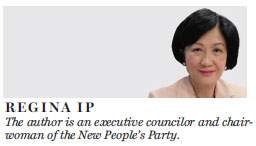Lessons from Taiwan's elections
Updated: 2016-02-03 08:27
By Regina Ip(HK Edition)
|
|||||||||
Regina Ip says HK's political landscape could be redrawn in the LegCo elections if the main parties do not wake up to the new realities which are facing us today
Even before the conclusion of Taiwan's leadership and legislature elections on Jan 16, the defeat of the Kuomintang's candidate Eric Chu Li-luan by Tsai Ing-wen of the Democratic Progressive Party (DPP) was a foregone conclusion. The heavy losses sustained by the Kuomintang in the "legislative yuan"'s elections and the meteoric rise of the young challengers from the New Power Party, however, caught many by surprise. The stunning outcomes hold many lessons for Hong Kong.
From the outset, the Kuomintang's campaign seemed doomed to fail. Entering the fray as a last-resort replacement for the Kuomintang's first woman candidate Hung Hsiu-chu, Eric Chu Li-luan's campaign came across as lacking in courage and conviction. Chu's inability to move people with him, coupled with Ma Ying-jeou's many policy missteps, caused the Kuomintang to lose more than three million votes in the leadership election and almost half of its seats in the "legislative yuan". The double-whammy blow for the Kuomintang led many to wonder whether this grand old party would ever regain its past glory as Taiwan's dominant political force.
As in Hong Kong, the mainland was the dominant factor affecting the outcomes of the elections. Identity issues and the relationship between Taiwan and the mainland loomed large in the struggle between the "blue" and "green" camps. How should Taiwan define and conduct its relationship with the powerful mainland? How Taiwan residents see themselves - as Chinese, Taiwanese or "nationals" of Taiwan as an independent political entity - were defining issues in the elections.
Prior to the elections, the historic meeting between President Xi Jinping and Ma Ying-jeou, then leader of Taiwan, in Singapore on Nov 7, 2015 re-affirmed the 1992 consensus of "One China" as the foundation for the conduct of cross-Straits relations. While Xi appealed to the strong, indestructible blood ties between the people of China across the Straits, Zhang Zhijun, director of the Taiwan Affairs Office of the State Council, made it quite clear after the meeting that the "One China" policy was Beijing's baseline. Against these cast-iron pronouncements, in the run-up to the elections, Tsai Ing-wen fudged her position on cross-Straits relations - she understood and respected the 1992 consensus, but fell short of accepting it as the basis for the development of future relations.
Tsai knew too well Taiwan was too economically intertwined with the mainland. Taiwan's economic growth rate slowed to an anemic 0.85 percent in 2015. Taiwan was part of East Asia's "economic miracle" in the 1980s. But local tech giants like smartphone maker HTC were on the brink of being edged out by Korea's Samsung and China's Xiaomi. Tsai was acutely aware that a rocky relationship with the mainland would not only jeopardize Taiwan's economy but could also hand the DPP a bruising defeat in four years' time.
The same ambivalence cannot be said of the young turks from the New Power Party, whose candidates won over 740,000 votes and five seats in the "legislative yuan". Led by the leading figures of the "Sunflower" student movement, this nascent party threw caution to the wind and made Taiwan independence the centerpiece of its platform. In a political "uprising" not dissimilar to the surge of the Hong Kong nativists in last year's district council elections, the ascendance of the New Power Party was symbolic of the angst of Taiwan's youth - a new generation of local-born young people who fret at Taiwan's stagnation but refuse to be part of the "China dream".
As in most elections, Taiwan's voters were moved by emotions rather than rational arguments. A symbol, a flag, an image had turned tides in the past, and the elections in January were no exception. On the eve of the elections, the glum apology tendered by teenage K-pop singer Chou Tzu-yu for waving the Kuomintang's flag angered Taiwan voters so much that some estimate that half a million more votes were pushed toward Tsai. Elections are won, or lost, on tears, sometimes even blood, and passion. Perseverance and determination, as in the case of 74-year old James Soong Chu-yu, who succeeded in garnering one million more votes than in the leadership election in 2012, paid off. Voters reward the brave and the earnest campaigner, irrespective of party base or age.
Like Taiwan, Hong Kong needs to deal with the anger of its young people over Hong Kong's stagnation and the consequential erosion of Hong Kong people's pride and self-esteem. Many young challengers supplanted the old soldiers in Hong Kong's district council elections last November, and Hong Kong's political landscape risks being redrawn in this September's Legislative Council elections if the established parties do not wake up to the new reality.

(HK Edition 02/03/2016 page10)